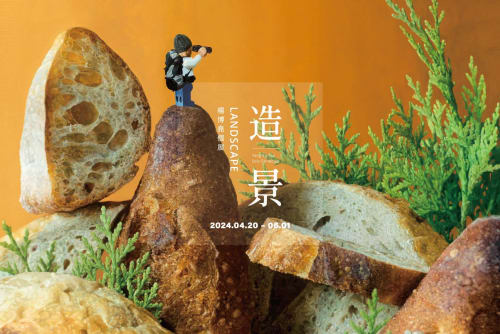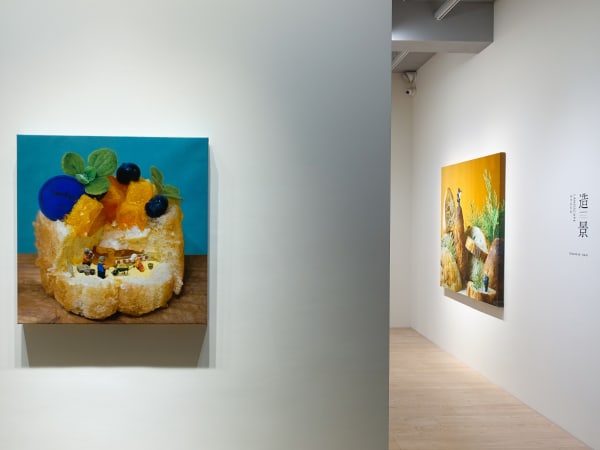造景-楊博堯個展: LANDSCAPE: Yang Bo-Yao Solo Exhibition
Past exhibition
Overview
■ 展期 Duration|2024 / 4 / 20 - 6 / 1
■ 開幕 Opening|2024 / 4 / 20 (Sat) 3 PM
■ 地點 Venue |大河美術 RIVER ART GALLERY
大河美術將舉辦楊博堯最新個展《造景》,繼藝術家前一檔個展《產地到餐桌》後,視角從生產線與供應鏈,轉為更為宏觀的當代議題。本展亦從人們常見於餐桌的食材作為視覺語彙的切入點,結合地質學與現今蓬勃發展的工業及數位科技所影響之人們的日常種種現象,揭開一場人與自然系統、科學與文化間的有趣思考。
地質年代,是人為性地描述地球歷史事件的時間單位。在地質學上,這些時間軸的定義與生物演化及滅絕息息相關。現今人類所處最年輕的地質年代被稱作「全新世」,然而,近年來卻有更多學者認同諾貝爾化學獎得主保羅.克魯岑提出的全新地質年代──人類世。2014年臺北雙年展首次以「人類世」為議題,開啟臺灣藝術界對於此現象的討論。時至2020年疫情猖獗前,法國知名學者布魯諾.拉圖與獨立策展人馬汀.圭納搭檔合作,也以《你我不在同一星球上》為展題,延續著「人類世」所帶出的概念,質疑科學視覺技術限制了人類「看見」地球的途徑。楊博堯將展覽命名為《造景》,精準地道出儘管人類世依舊存有許多論證空間,回看人類至今之活動痕跡所影響、改變甚至主宰這個地球而衍生出的各種事件,「人類世」這個詞所帶出的象徵意涵,無疑是當代人類無可避免的議題。
本次展出的作品亦可看見楊博堯的經典符號「樂高人」,並與人類最初開始改變地貌的「生產行為」所產出的「食物」息息相關。透過此基礎,描述人們因科技的創新進步,掌握了主導權後,逐漸對大自然不再尊重,不畏後果地立下一個又一個的紀念碑,刻畫自身在地球上的成就。最終,使得古文明的深厚底蘊,成為當代的陪襯。面對頻頻發生的各種極端氣候現象,人們已開始意識到與自然和解的重要性,試圖在象徵著驕傲的人造風景中,嘗試加入自然的元素。
楊博堯認為,真正的自然是不需要人類就能夠獨自生存,而這些「人造自然」,依舊是我們活動的產物。藝術家藉由生動有趣的畫面來描述問題,試圖啟發並促成更廣泛地對話。如何在保有現今生活方式並享受各種科技產物之便利的前提下,減緩人類活動對地球帶來的負面影響,同時盡可能守護僅存的自然景觀,我們邀請觀者來到這個造景世界,探討這道全人類終其一生的課題。
RIVER ART GALLERY is going to present the latest solo exhibition "LANDSCAPE" by Yang Bo-Yao. Following the artist's previous solo exhibition "From Place of Origin to the Table", the perspective shifts from the production line and supply chain to a more macroscopic contemporary issue. This exhibition takes common food ingredients found on dining tables as a starting point for visual vocabulary. It combines geology with the various phenomena of daily life influenced by the booming industrial and digital technology of today, uncovering an intriguing exploration between human beings and natural systems, science, and culture.
Geological epochs are artificial time units describing historical events on Earth. In geology, the definition of these time scales is closely related to biological evolution and extinction. The youngest geological epoch in which humanity currently resides is known as the "Holocene". However, in recent years, there has been growing acknowledgment among scholars of a new geological epoch — the Anthropocene, proposed by Nobel laureate in Chemistry, Paul Crutzen. The Taipei Biennial 2014 first explored the topic of the “Anthropocene”, initiating discussions within the Taiwanese art community about this phenomenon. Leading up to the COVID-19 pandemic in 2020, renowned French scholar Bruno Latour collaborated with independent curator Martin Guinard on the exhibition "You and I don’t Live on the Same Planet", continuing the concept brought about by the “Anthropocene”, questioning how scientific visualization technologies limit humanity's "seeing" of the Earth. This show, is titled "LANDSCAPE" by the artist, precisely articulating that despite ongoing debates surrounding the Anthropocene, reflecting on the impact, changes, and even domination of the Earth by human activities thus far, the symbolic significance brought about by the term "Anthropocene" is undoubtedly an unavoidable contemporary issue for humanity.
The exhibited works also feature Yang's classic symbol, the "LEGO figure", intricately linked with the "food" produced by the "production behaviors" that initially began to alter the landscape. Through this foundation, the artist describes how, with the progress of technological innovation, humanity has gradually lost its respect for nature after gaining dominance and, without fear of consequences, has erected monument after monument to depict their achievements on Earth. Ultimately, the profound heritage of ancient civilizations becomes a backdrop for the contemporary world. Faced with frequent extreme weather phenomena, people have begun to realize the importance of reconciliation with nature, attempting to incorporate elements of nature into the symbolically proud artificial landscapes.
Yang Bo-Yao believes that true nature can survive independently without human intervention, and these "man-made nature" landscapes are still the product of our activities. Through vivid and engaging imagery, he aims to describe these issues, inspiring and fostering broader conversations. How to mitigate the negative impacts of human activities on the Earth while retaining our current way of life and enjoying the convenience of various technological products is a lifelong challenge for all humanity. We invite viewers to explore this landscaped world and discuss this universal issue throughout humanity's existence.
Installation Views






